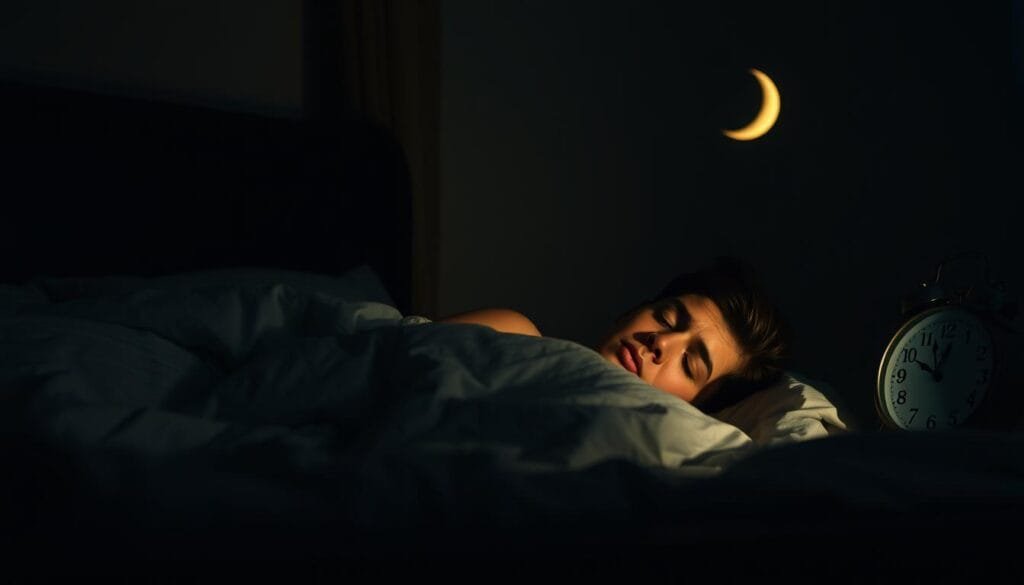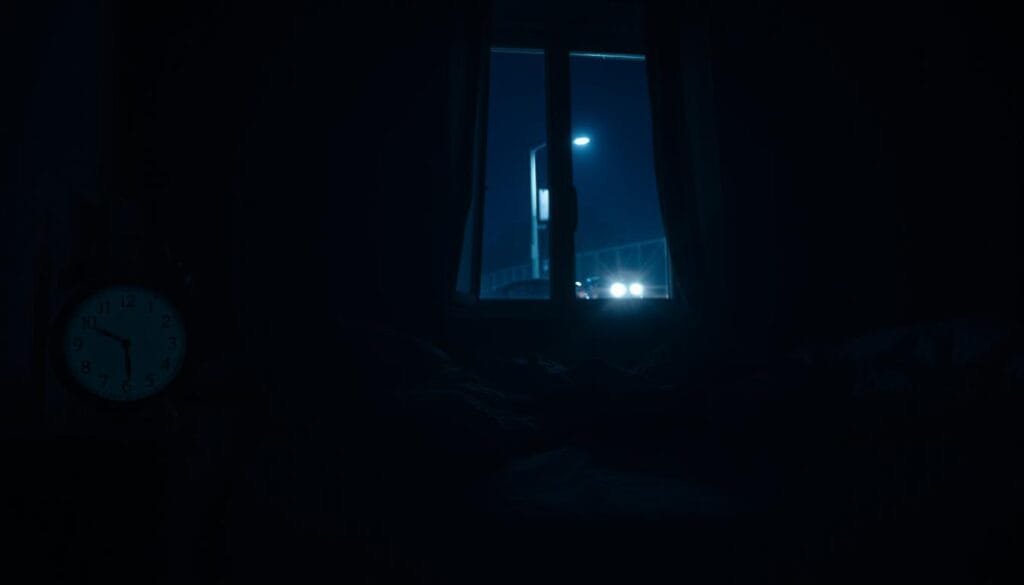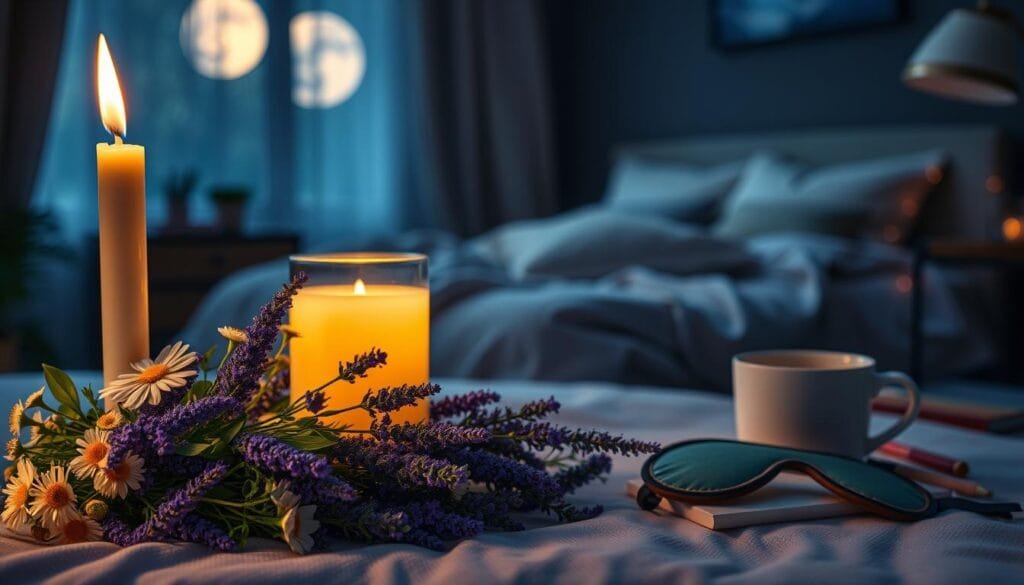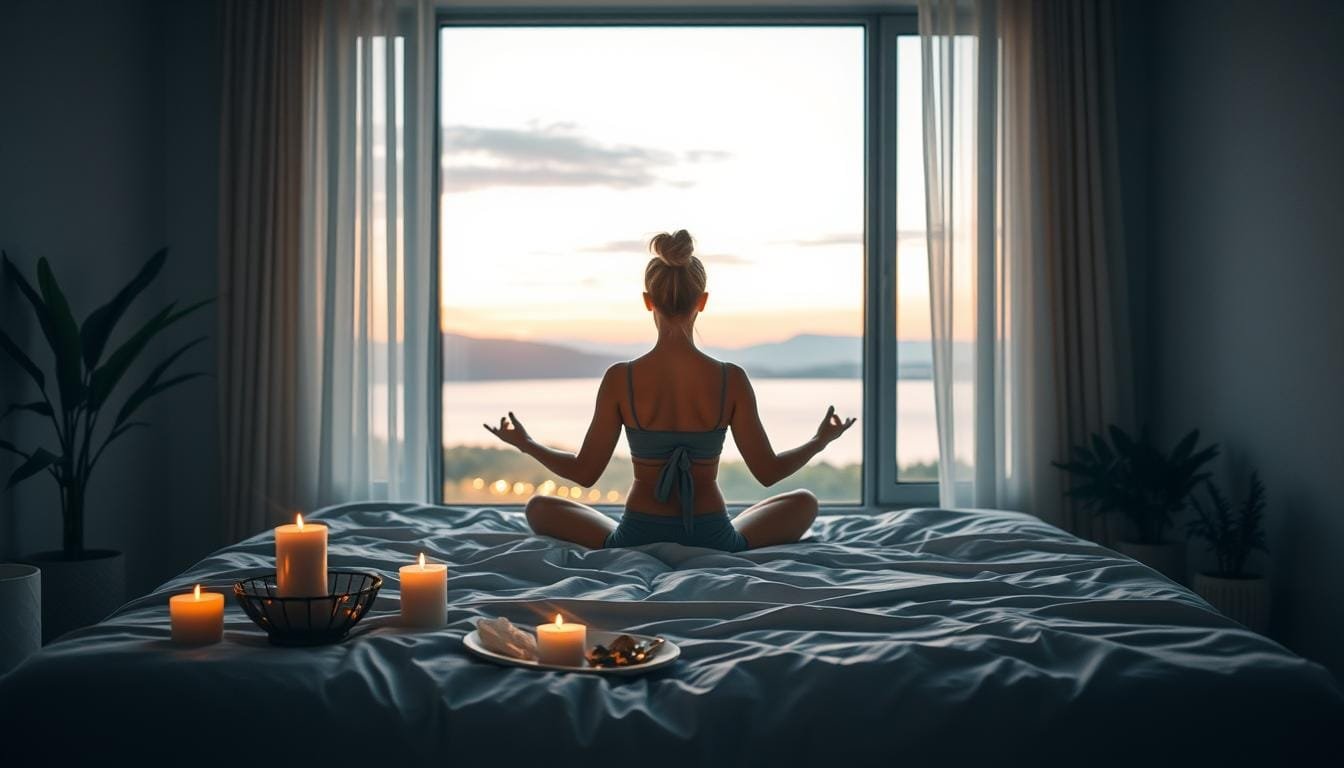Do you lie awake, your mind racing, unable to stop the thoughts that keep you up? You’re not alone. Almost 30% of adults struggle with sleep problems caused by anxiety. This creates a cycle that affects your mind and body.
Night anxiety can turn your bedroom into a place of worry. With about 31.1% of U.S. adults dealing with anxiety, the fight is real and personal. But, there are natural ways to calm your anxiety at night without medication.
This guide will show you how to manage insomnia and sleep anxiety without drugs. We’ll look at effective strategies to help you take back your nights. You’ll wake up feeling refreshed and ready to go.
Key Takeaways
Undertanding Night Anxiety and Its Impact on Sleep Quality
Night anxiety can turn your peaceful bedroom into a place of racing thoughts and restless feelings. Almost 40 million adults in the U.S. face anxiety disorders. Up to 90% of them struggle with sleep problems. Knowing how anxiety affects your sleep is key to finding natural ways to calm down at night.

Anxiety makes your body feel alert, making it hard to relax before bed. This makes it tough to calm down and sleep well.
Physical Symptoms of Nighttime Anxiety
When night anxiety hits, your body shows many signs:
- Increased heart rate
- Muscle tension
- Rapid breathing
- Sweating
- Trembling or shaking
Mental and Emotional Effects
Nighttime anxiety also affects your mind. It’s hard to relax and focus because of:
- Persistent worrying
- Racing thoughts
- Difficulty concentrating
- Overwhelming sense of dread
The Sleep-Anxiety Cycle
Anxiety and sleep create a tough cycle. Poor sleep can make anxiety worse, and anxiety can disrupt sleep even more. To break this cycle, you need to know your triggers and use relaxation techniques.
Research shows that effective sleep hygiene practices can improve sleep quality in 70% of individuals struggling with anxiety-related insomnia.
Common Triggers That Fuel Anxiety at Night

Understanding what causes nighttime anxiety is key to better sleep. Many things can make your evening stress worse and keep you awake.
Stress from work and personal life is a big factor. Job worries, relationship issues, and money problems can feel worse when you’re alone at night.
“The mind becomes a playground for worries when the world grows quiet.” – Sleep Anxiety Research
Here are some main causes of nighttime anxiety:
- Caffeine consumption (after 2 PM)
- Irregular sleep schedules
- Unresolved daily stress
- Health concerns
- Technology use before bedtime
A 2022 study found that too much coffee can make anxiety worse. It might even lead to panic attacks. Some medicines, like birth control or weight loss drugs, can also make anxiety worse.
If you’re looking for herbal ways to calm down at night, knowing these triggers is important. Doing relaxation exercises can help with insomnia caused by anxiety. Knowing what triggers your anxiety helps you find ways to deal with it.
Genetics also play a part. If your family has anxiety, you might be more likely to experience it at night. Your environment and past experiences can make it worse.
The Science Behind Sleep Anxiety and Mental Health
Anxiety and sleep are closely linked, affecting your mental health. About 40 million adults in the U.S. have anxiety disorders. Sadly, 50-70% of them also face sleep problems.

Learning about the link between anxiety and sleep can help. It’s key to find natural ways to sleep better when anxious. Stress affects your brain, making it hard to sleep well.
How Anxiety Transforms Sleep Architecture
Anxiety changes how you sleep. Your sleep cycles break up, making your rest less quality. Using relaxation techniques can help fix these sleep issues.
- Reduced deep sleep stages
- Increased light sleep periods
- Frequent nighttime awakenings
- Difficulty transitioning between sleep cycles
The Hormone Stress Connection
Stress hormones like cortisol mess with your sleep. Deep breathing exercises can help control these hormones. This might lessen anxiety-related sleep issues.
Brain Activity During Anxious States
Your brain’s emotional parts work too hard when anxious. This is mainly due to the amygdala. It’s hard to sleep well when your brain is racing, making it key to manage nighttime anxiety.
Sleep is not merely rest, but a critical process for mental and physical restoration.
By grasping these scientific facts, you can create better sleep and anxiety management plans. This can greatly improve your life.
Natural Ways to Calm Anxiety at Night for Better Sleep

Struggling with nighttime anxiety can make it hard to fall asleep. Luckily, there are natural ways to calm your anxiety at night. By using sleep hygiene tips and mindfulness meditation, you can create a peaceful bedtime routine. This routine can help reduce stress and promote relaxation.
Herbal remedies are a gentle way to manage nighttime anxiety. Here are some natural options:
- Chamomile tea: A mild sedative that can help reduce short-term anxiety symptoms
- Lavender: Aromatherapy or oral supplements may help decrease anxiety
- Lemon balm: Can potentially lessen worry and excitability
Mindfulness meditation is a powerful tool for calming your mind before bed. Start with simple breathing exercises. These exercises help shift your focus away from racing thoughts. Practice deep, slow breaths for 5-10 minutes, focusing on each inhale and exhale.
Remember, natural sleep strategies aim to address underlying factors contributing to sleep disturbances.
Sleep hygiene tips can greatly improve your nighttime routine. Create a consistent sleep schedule, limit screen time before bed, and ensure your bedroom environment promotes relaxation. These small changes can make a big difference in managing anxiety and improving sleep quality.
- Maintain a consistent bedtime
- Reduce blue light exposure
- Create a calm bedroom environment
While these natural methods can be effective, if anxiety persists, consult a healthcare professional. Some herbal supplements may interact with medications, and individual responses can vary.
Creating an Anxiety-Reducing Bedtime Routine
Creating a consistent bedtime routine can help manage anxiety and improve sleep. About 40% of adults deal with nighttime anxiety. So, a calming evening ritual is key for mental health.
Your evening routine should help you relax slowly. It tells your body it’s time to calm down. Doing calming activities before bed can lessen anxiety and help you sleep better.
Optimal Timing for Evening Activities
Begin winding down 90 minutes before bed. This lets your body and mind relax. Try these activities:
- Gentle yoga for anxiety relief
- Light stretching
- Meditation or deep breathing exercises
- Reading a calming book
Bedroom Environment Optimization
Make your bedroom a calm place. Use essential oils like lavender or chamomile for a soothing feel. Your bedroom should be:
- Cool (around 65°F)
- Dark
- Quiet
- Free from electronic distractions
Digital Device Management
Blue light from screens can mess with your sleep. Turn off devices an hour before bed. Replace screen time with relaxing activities that calm your mind.
Remember, consistency is key in creating an effective anxiety-reducing bedtime routine.
Mindfulness and Relaxation Techniques for Night Anxiety
Nighttime anxiety can turn a calm evening into a stressful one. But, mindfulness practices can help you sleep better and calm your mind. Studies show that 60% of people who practice mindfulness sleep better.
Deep breathing exercises are great for fighting night anxiety. They help lower stress and get your body ready for sleep. Here are some methods to try:
- 4-7-8 Breathing Technique: Inhale for 4 seconds, hold for 7 seconds, exhale for 8 seconds
- Diaphragmatic breathing to lower heart rate
- Progressive muscle relaxation to release physical tension
Body scan meditation is also good for night anxiety. It relaxes each muscle group, helping you feel calm. Studies show it can reduce muscle tension by up to 60%, making it key for better sleep.
Mindfulness is not about perfection, but about creating a moment of calm in the midst of chaos.
Visualization and gratitude meditation can also help. They help you focus on calm thoughts. With regular practice, you can manage night anxiety and sleep better.
Starting a mindfulness practice takes time and patience. Begin with short sessions and increase them as you get more comfortable.
The Role of Exercise in Managing Sleep Anxiety
Exercise is a strong tool for fighting sleep anxiety and better sleep. About one-third of Americans sleep less than seven hours. It’s key to know how exercise helps at night.
Regular exercise helps those with anxiety sleep better. Studies show it cuts down on anxiety before bed and improves sleep.
Best Types of Exercise for Sleep
Some exercises are better than others for calming anxiety at night:
- Yoga for anxiety relief
- Low-impact walking
- Swimming
- Gentle stretching
- Pilates
For insomnia, try relaxation exercises like mindful movement. Yoga is a top choice for its physical and mental benefits.
Timing Your Workouts
When you work out matters for sleep anxiety. Experts say to avoid hard workouts before bed. They can keep you awake.
- Morning or afternoon exercises are best
- Do 30 minutes of moderate activity
- Finish workouts 2-3 hours before bed
Just 30 minutes of daily exercise can add 15 minutes of sleep for those with insomnia.
Adding regular, mindful exercise can lessen night anxiety and boost sleep quality.
Dietary Considerations for Better Sleep and Reduced Anxiety
Your diet is key in managing anxiety and improving sleep. Natural sleep aids for anxiety sufferers can be found in your kitchen. They offer holistic ways to calm your mind and prepare for restful nights.
When looking for herbal remedies to support sleep, consider these dietary choices:
- Consume complex carbohydrates to boost serotonin levels
- Include omega-3 rich foods like salmon
- Drink calming herbal teas before bedtime
- Prioritize hydration throughout the day
Some remarkable natural ways to calm anxiety at night involve specific food strategies. Kiwis, for instance, have been scientifically shown to improve sleep quality. Participants in studies who ate two kiwis one hour before bedtime experienced faster sleep onset and better overall rest.
Avoid sleep disruptors like caffeine, which should be eliminated at least 10 hours before bedtime. Alcohol, while initially sedating, can fragment your sleep and increase nighttime anxiety.
Key nutrients that support relaxation include magnesium, tryptophan, and zinc. Consider incorporating foods like:
- Whole grains
- Nuts and seeds
- Lean proteins
- Tart cherry juice
Remember, dietary changes take time to impact anxiety levels. Always consult healthcare professionals for personalized advice tailored to your specific needs.
Environmental Adjustments for Peaceful Sleep
Creating the perfect sleep sanctuary is more than just a comfy bed. Your bedroom’s environment is key to managing nighttime anxiety and getting good sleep. The right sleep hygiene tips can turn your bedroom into a peaceful haven.
Temperature is vital for sleep quality. Experts say keep room temperatures between 60–67°F (15–19°C) for the best sleep. Also, keep humidity levels between 30–50% for perfect sleeping conditions.
- Use breathable bedding materials like cotton or linen
- Invest in weighted blankets for anxiety reduction
- Consider blackout curtains to block external light
Sound management is also important for sleep. Calming music or white noise machines can cover up background noises. A 2017 study showed that controlling environmental noise greatly improves sleep quality.
“Your bedroom should be a sanctuary of calm and relaxation.” – Sleep Wellness Institute
For those with nighttime anxiety, weighted blankets are a great help. They offer deep pressure stimulation, which can lessen stress and give a sense of security.
- Replace mattresses every 7-10 years
- Wash sheets weekly
- Replace pillows every 1-2 years
By making these environmental changes, you can make a sleep-friendly space. This space supports relaxation and helps manage nighttime anxiety well.
When to Seek Professional Help for Night Anxiety
It’s important to know when night anxiety is more than a short-term issue. Natural methods to calm anxiety at night can help. But, some cases need professional help.
Night anxiety can be very tough, making it hard to sleep well. Knowing when to get help is key to keeping your mind and body healthy.
Recognizing Severe Sleep Anxiety
If you’re not getting better with natural methods, it’s time to seek help. Look for these signs:
- Persistent insomnia lasting more than four weeks
- Panic attacks that occur frequently at night
- Significant daily functioning impairment
- Constant worry about sleep that prevents relaxation
- Physical symptoms like rapid heartbeat or excessive sweating
Treatment Options for Sleep Anxiety
There are many ways to treat sleep anxiety without drugs. Healthcare providers might suggest:
- Cognitive Behavioral Therapy for Insomnia (CBT-I)
- Individual psychotherapy
- Stress management techniques
- Sleep study evaluations
Remember, seeking help is a sign of strength, not weakness. Experts can create plans tailored to your needs. They help you find peace and restful sleep again.
Conclusion
Dealing with night anxiety needs a complete approach. With 31.1% of U.S. adults facing anxiety, finding ways to calm down at night is key. It’s important for your health and happiness.
Creating peaceful nights is about finding what works for you. Studies show that therapy, mindfulness, and regular sleep times help a lot. Mixing these methods can make a plan that fits you perfectly.
Be patient with yourself as you work on night anxiety. Almost 70% of people who practice mindfulness feel less anxious. Keep going, stay true to your goals, and ask for help if you need it.
You can achieve better sleep. Know what triggers you, make your space supportive, and use proven methods. This way, your nights can become times of rest and healing.






